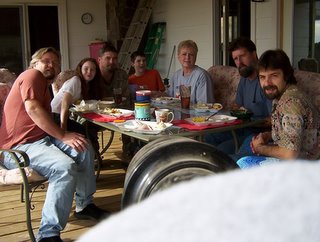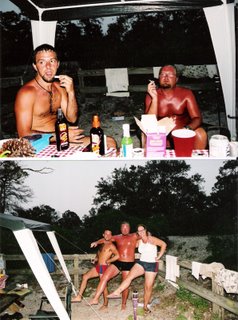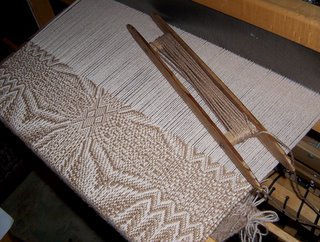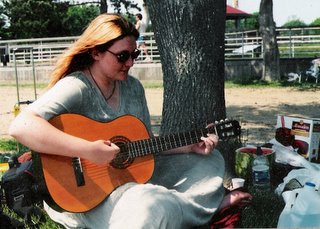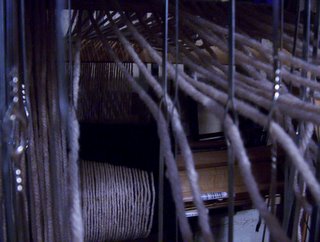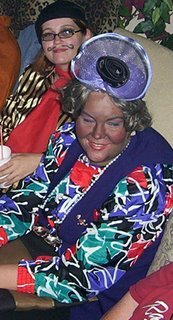Homesick for Juchitan
Yesterday, while driving around with Sonya and Kelly, and Alan, we started talking about Mexico again. We agree that we are homesick for it, still. They're both longing for Puerto Angel, Alan dreams about Palenque, and I'm in love with Juchitan. This morning, while surfing the net about weaving, I came across the term, "tejido huave," which means either weaving made by the huave, a people living south of Juchitan, out on the penninsula, or possible even to the weavers themselves-my grasp of Spanish isn't sufficient enough to really know the difference. Right down the highway from my favorite Mexican town is a penninsula sticking out on the ocean, with a town called San Mateo del Mar, which, if I remember correctly, has nearly 10,000 huave indians, with an extremely active weaving community. Juchitan, bieng a matriachal society, has had an appreciation of beauty, and since 1970, in an effort to cultive beauty through the arts, has held annual weaving competitions.
 I have a question about matriarchal societies: Who cleans the house? I mean, In Juchitan, we saw beautiful older women all over the market, and a whole lot of drunk men. Do these women run the businesses AND the households, while their gay sons are busy having drag parties and their husbands are drunk?
I have a question about matriarchal societies: Who cleans the house? I mean, In Juchitan, we saw beautiful older women all over the market, and a whole lot of drunk men. Do these women run the businesses AND the households, while their gay sons are busy having drag parties and their husbands are drunk?Juchitan grows a lot of flowers (supprise suprise!). At the market, we bought some jasmine to sniff while walking around the carneceria, with the heat and everything...
This came from the Advocate:
Mexico's queerest corner: the author of Sliced Iguana: Travels in Mexico finds a rare point on the globe where queer life is not only respected but revered
Advocate, The, August 30, 2005 by Isabella Tree
In the hazy glow of a Pacific afternoon two teams of transvestites are engaged in their weekly basketball match. They're wearing microskirts and crop tops and shrieking like schoolgirls. They run as badly as I do, kicking up their heels and flapping their arms around, and throw the ball to each other like it's a bomb about to go off. Their hairdos are miracles of invention and peroxide, with enough hair spray on them to stop a palm tree rustling in a hurricane. Two or three substitutes are lolling about on the sidelines, idly plucking their legs. When they notice me watching, they lift their chins and pose like swans.
This scene takes place in Juchitan, a thriving commercial town on the Pacific coast of Mexico, on the Isthmus of Tehuantepec. It's not something you would see anywhere else in the country (or, possibly; any other). In the rest of Mexico, coquettish gay extroverts like these would be hounded out of town by the local machos: There would be shouts of putos or jotos (pools, faggots), wolf whistles, the odd missile. And their mothers and sisters, far from being the proud champions of womanhood most are here, would likely be struggling to live up to Mexico's more generally accepted image of the ideal woman, the mujer abnegada, a self-sacrificing slave who suffers the iniquities of life in silence, like the Virgin Mary herself.
We cross the street to buy some basil. The herb seller lifts out whole bushes of basil, roots and all, dripping from a bucket, and it's not until I hear her voice that I notice she's a man. She's wearing the traditional lone skirts and braided hair of a Juchiteca, but her hands are big and hairy and there's a prominent Adam's apple above the collar of her huipil blouse.
She gives me a beefy, saucy grin as she hands back my change. [Local women] Natalia and Lanreana laugh when they see my confusion. Peeved, I ask them if all the men in Juchitan are gay. They can't give me statistics, but they reckon at least a third of them must be. They refer to them as muxes, a Zapotec word, and though the phenomenon is widespread across much of the Tehuantepec peninsula, Juchitan, they tell me, is so famous for homosexuality it's known as "Muchitan."
Traditionally, muxes dress, like the basil seller, as Juchitecas. They are honorary women and therefore the only men allowed to sell in the market. Or they wear pantalones like other men, the only giveaway a back-pocket handkerchief or a hibiscus in their hair.
Whatever their plumage, muxes are hugely respected. They're generally regarded as gifted and creative, hardworking, and--until they're crossed in love, at least--patient and kind. Apart from selling in the market and, most often, working as cantineras, or barmaids, many become cooks, seamstresses, hairdressers, florists, set designers for parties and weddings, or they simply stay at home to mind the children and do the housework--a job that is regarded with exceptional admiration in Juchitan.
This is why Juchitecas are often pleased when their sons prove to be gay. "Never mind, perhaps this one will be a muxe," is the usual consolation for some poor woman who's given birth to yet another son. Teenage heterosexual boys, these mothers know, are bound to bring heartache. Juchitecas expect that they'll be disobedient, idle, and wasteful, staying out all hours, endlessly looking for someone to "raise their mast," getting into fights. And they're expensive. To get a son off your hands in Juchitan you may have to set him up with a dowry--some money or some animals or even some land; you'll certainly have to throw the wedding party.
To have a gay son is infinitely preferable. There's no stigma attached to homosexuality here. As one proud and disarmingly frank Juchitec mother explained it to me: "God puts the heat in different holes, that's all."
THE ROAD TO JUCHITAN Getting to this Oaxacan town of 100,000 people requires a short flight from Mexico City to Huatulco. From there it's a scenic three-hour drive to Juchitan.
[ILLUSTRATION OMITTED]
COPYRIGHT 2005 Liberation Publications, Inc.
COPYRIGHT 2005 Gale Group
